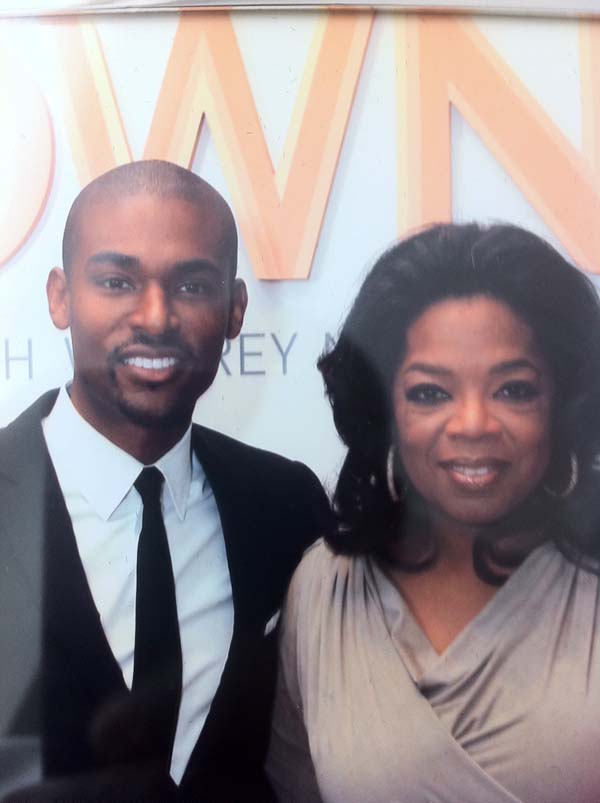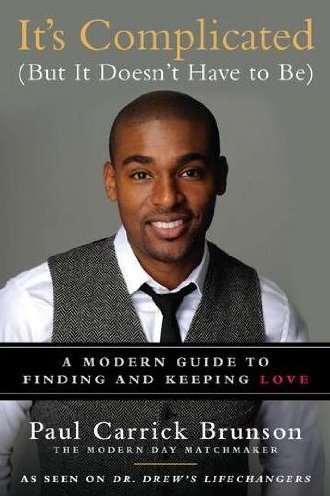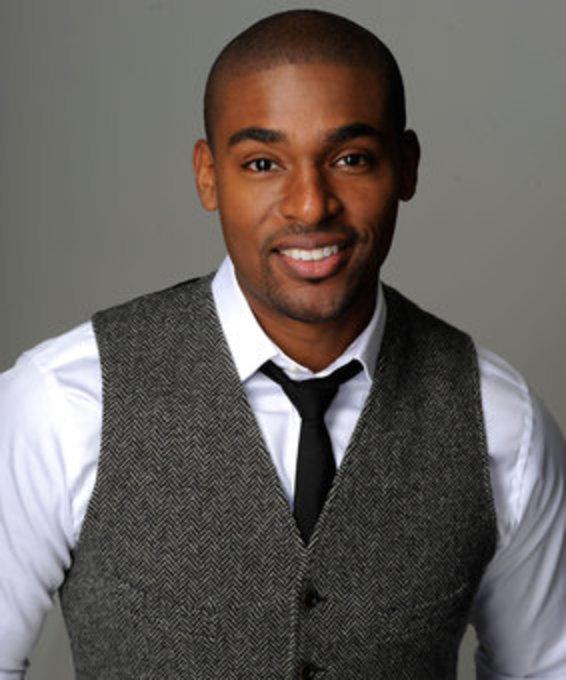Paul Carrick Brunson knows a thing or two about success. After giving up a lucrative career as an investment banker, Brunson followed his passion and reinvented himself as a professional matchmaker–shattering the mold and establishing himself as one of the newest and freshest voices in motivational sector.
In just four years, the 36-year-old Jamaican-American has made a name for himself and has been dubbed the real live “Hitch,” hooking up couples from coast to coast and catching the eye of media heavyweights like Dr. Drew and Oprah.
Despite his meteoric success, it hasn’t been easy. While he’s built a reputation for helping others find love, Brunson’s most difficult moments came when critics questioned his commitment to his craft and even slung their critical arrows at his beloved wife, Jill.
Through it all, Brunson’s been able to overcome the obstacles and shoot to the top on his own terms. Why? He believes—in God, in himself, and in his passion.
Recently I had the opportunity to chat with Brunson about his journey to success and his new book, It’s Complicated (But It Doesn’t Have to Be): A Modern Guide to Finding and Keeping Love.
Check it out.
Britni Danielle: You initially came out of the financial sector and you just didn’t feel right about your job. I read you were suffering from anxiety so you quit. Some people would call this crazy because you were making good money, but what gave you the courage to make a change?
Paul Carrick Brunson: That story you found is definitely accurate, but one part that a lot of people don’t include is that I initially worked at an investment bank; I was an investment banker. I did quit at that time because I had terrible anxiety. I literally was not happy, and I had gone through experiences in college where my best friend and a second friend that was very close to me died when I was in school–all within a three-year period. I realized that life is incredibly short and there’s one thing you better be damn sure of and that is that you’re happy.
BD: So, how did you get into matchmaking?
PCB: I was checking the students in [at summer camp in 2008], and saw that not one had a two-parent household. I went back home and my wife and I were talking about what we can do to strengthen families. My wife joked; she was like, “Why don’t you become a matchmaker?” It was literally a joke.
We start inviting our single friends over to our house in big groups of eight or 12 people, and people were meeting and mingling and dating, and we thought there was something about matchmaking that made sense.
I decided to go to a matchmaking conference in 2008 to just kinda sit in the back of the room and watch. I was sitting in the back with 250 of the world’s top matchmakers and not one was black, not one was under of the age of 40, and not one was a male. That’s when the light bulb went off.
BD: How do you then make the progression from hosting dating events, to working with Oprah and now the book? I’ve been watching from afar and, to me, it really looks amazing, but I’m sure it’s built on the back of very difficult work.
 PCB: It’s definitely been kinda ebb and flow. Without question there’s been downs. But you’re right, the perception from most folks is this dude’s been on a rocket ship and just taken off.
PCB: It’s definitely been kinda ebb and flow. Without question there’s been downs. But you’re right, the perception from most folks is this dude’s been on a rocket ship and just taken off.
But when I decided to go public that I was a matchmaker, I didn’t know how to do it. My wife actually suggested that I do it through video. Initially when I did my YouTube videos I didn’t get very many views, but where they got picked up is people like Slim Jackson of Single Black Male, and Very Smart Brothas, and some of these other sites that had audiences saw what I was doing and respected it. That is what really gave me the first step into the space because I was able to tap into their audiences and they invited me in. From there I would write as much as I could, but my next step was doing live events.
BD: In these past couple of years, what has been the most difficult part of the journey?
PCB: Building a tough skin to take the criticism and the attacks. We always want people to like us, and especially because I’m in service work. But you see one or two crazy comments on a blog post, and then you see more. The biggest attack has come from me being outspoken about God. But attacks on my wife…that’s been the hardest to deal with.
BD: What’s the best part so far?
PCB: The best part is knowing you’ve changed somebody’s life. When someone walks up to me at a live event or sends me a message and says, “Paul because of this thing that you said or because of this thing that you did, I now feel like my life is better.” That’s incredible.
BD: How do you manage that? I don’t have the same sort of audience that you do, but whenever somebody says to me, “Oh you inspired me,” I feel sort of…embarrassed. So how do you manage that on a massive scale? And how do you manage to not downplay your accomplishments and still remain humble?
PCB: Yesterday was a great example. I was really pushing hard on my book sales yesterday and I was posting on Facebook trying to keep everyone updated, and someone hit me on Facebook and was like, “Hey Paul, I don’t understand why you keep posting all of this. You used to be this humble guy, but now it seems like you’re all about sales. I feel like you’re changing on us.”
What’s fascinating is that while in my heart I believe he’s incorrect in that, what I was trying to say was look there is a business side but as a group look at how good we’re doing. At the same time it’s very fine line, but there are countless people that have audiences 1000 times larger than me who are able to do it and do it well. Ultimately we have to keep focused and keep passionate about why we’re doing it.
That’s the key. Never lose focus on why we’re doing it, and never lose focus on what our self-worth and value is.
BD: Let’s talk about the book, It’s Complicated. Tell me a little bit about it.
PCB: The book is two years in the making and it is a really good synthesis of everything I’ve always wanted to see in a relationship book. On Amazon it’s categorized as “Happiness,” and I kind of like that.
Everything I’ve wanted to see like historical data, all of the sciences, all of the new age stuff like technology and the impact of social media, and even some of the pick-up artistry. It includes all of these elements in one place, in one book. I think it’s a book that will stand the test of time.
And it’s simple. Each chapter is a rule and there are 21. I believe if those are executed on then you will develop the skill of establishing and maintaining a relationship.
BD: What do you say to the people who automatically recoil at the thought of another relationship book? On the heels of Think Like A Man, how do you deal with not getting pigeonholed into the psudo-relationship guru label?
PCB: That is a great question and that was a huge fear. As a matter of fact, I argued with my publisher to not to have my face on the cover of the book. Obviously I lost that battle (laughs). But I didn’t even want my face on the cover because I didn’t want to fall into that whole category of what you just mentioned.
But ultimately, content is king. If the content of the book is what I’m claiming it is, then maybe three years from now someone is going to say you really need to read this book.
I’m patient. I’ve already been paid my advance (laughs), so I think that this book is going to do it. I’m not longer concerned, and my response is just read it. It’s completely different.
 BD: What do you hope people take away from the book?
BD: What do you hope people take away from the book?
PCB: I want people to really understand that one of the most critical skills we can have on this planet is being able to establish a relationship—a romantic, business, or platonic relationship. That’s one of the most important skills.
BD: You’ve had an amazing past few years, but you’ve also had some difficult times. What would you tell people who are on the verge of giving up on their goal?
PCB: We all have dreams. One of the things that I’ve realized is that I’ve had a lot of dreams and I’ve been an entrepreneur multiple times over. One of the things I’ve learned in my journey is that if you can’t operate within a 24-hour period without thinking about your passion, then you just can’t give up. And I don’t care if that means you’re a 40-year-old rapper still in your mom’s basement trying to put out an album. No matter what, you don’t give up.
But if you catch yourself taking a break on the weekends and you don’t really think about that thing for two days, well then you probably can give it up. And you probably should.
But for those who can’t give it up, what I would tell them is to talk to any entrepreneur who has “made it” and they will tell you there are four steps to success. And I talk about them in my book.
One is you gotta work your ass off. It sounds really easy to say, but I don’t even know if folks understand working their ass off.
Two is controlling everything you can control. There’s so many things we can control. Control it all.
Step three is identify the things you can’t control–and this is where we get caught up–instead of beating yourself up about it just realize there’s certain things that’s out of your control.
Then step four is you have to surrender. When you surrender and you have worked your ass off and you have controlled everything you can control, then you surrender, God will deliver to you a dream bigger than you could ever achieve. I’m a testimony.
#
I am giving away a copy of Paul Carrick Brunson’s new book, It’s Complicated. To be in the running, leave a comment explaining what you enjoyed about the interview and why you want to read the book.
A winner will be chosen at random on Thursday, October 26 at 9PM EST/6PM PST and will be announced on Twitter. Please follow me at @BritniDWrites to find out if you won!
*Want to join a supportive group of go-getters? Join us in the #GOALdiggers Facebook group!


WOW! This is an excellent interview and sound advice from Paul. Congrats to both of you!
Great interview, it was nice to learn about his transition into this. I’ve been following Paul’s column on Essence.com for a little while now and like that he gives balanced advice. Looking forward to seeing him live and purchasing the book.
What I enjoyed about the interview is Paul’s honesty and sense of humility. I too, have watched him from afar for a while now, and I appreciate how accessible he makes himself to his followers/supporters. You really feel like you’re on his journey with him. What I also liked was his advice on knowing what you can and cannot control while chasing your dreams. That’s so important! I want to read his book because I aspire to enter the same genre as a writer in the future, and I think his brand of coaching/relationship help is sincere and practical.
This line: “Two is controlling everything you can control. There’s so many things we can control. Control it all.” is why I want to read the book. It’s so true!! Sometimes I feel like life is happening TO me, as opposed to me being in control. Reading that reinforced how much power I have and how important it it to take the reins. Reminded me of the line in “Player’s Club”, the advice Diamond was given: “make that money, don’t let money make you”. LMAO! Wait – was it Player’s Club?
I love the part where he mentions if you can’t operate everyday without thinking about something you are passionate about, then don’t give up. Sometimes I wonder why try when I have I already have an okay career, but even when I’m tired I still have energy to just think about cool topics to write about or wonderful angles (even though I have no energy to actually write them), but that little nugget definitely gives me the push I need to get through today. Such a great interview!
I loved that part too. I even had to chuckle at the “40 year old rapper” reference. lol
That was a great article Britni! I actually read the entire thing. *not entering the giveaway though, lol*
I met Paul sitting at that 2008 Matchmakers conference and he really did seem like the “odd duck” in the room. So much so, I approached him and sat next to him and asked him why he was looking at matchmaking. He shared the same story about wanting to help a community of students and families (from what I recall) but he had this look of determination and a sense of purpose that was too strong to ignore. THE largest matchmaking and dating industry conference is held annually. THIS year is in Las Vegas in January 2013 at the Harrah’s Casino. It would AMAZING if Paul came back to now inspire the new group of dating coaches and matchmakers, so they can learn and understand the importance and responsibility of helping someone with their love life. I’m one of the conference organizers and a 20yr dating industry expert..but more importantly a big FAN of Paul for his work and achievements within a niche industry that so few really understand. Congratulations Paul and I am really NOT at all surprised at his success. He was going back home to implement a strategy. He was NO DOUBT- a Man With A Plan!!
s
I actually forgot to mention WHY I want to read the book- but I bought it- so I hope someone else gets the opportunity to enrich their life with his advice and experiences 🙂
Nice Job Britini….he’s right when u have a dream you think about it daily! Glad to see this brotha making moves. 🙂
Thanks Bailey! It does, doesn’t it?
As others have said, I liked this part:
“is that if you can’t operate within a 24-hour period without thinking about your passion, then you just can’t give up.”
I *think* about my memoir or something else I’m writing or want to write every day, although I can’t always sit down and complete the thought. Today is one of those days I feel like giving up because what I envision for my life seems impossible, but if I’m still thinking about it, there’s hope.
I want to see what these 21 rules are. 21 seems like such a manageable number, even I might not mess it up.
Hey Mariam,
Thank you for reading & responding. I just wanted to share what Iyanla Vanzant told me. She said that if you can’t SEE your vision then it won’t happen. I think you need to work on KNOWING that it’s possible, even if you’re not sure how you’ll get there.
Good luck!
Loved the interview…I’m definitely purchasing this book!
It’ seems interesting. Truthfully at first I cringed at the thought of yet another man telling me what would be best in a relationship, but I appreciate that this conversation covered two things. One that it isn’t only about intimate, romantic relationships, but it also touches on platonic and professional relationships as well. The second thing I can appreciate is his honesty. He simply states “just read it”, in a few years (acknowledging it may not happen instantly) that people will see how he differs from other male insight or perspectives on relationships. Good stuff! Can’t wait to read and review.
I enjoyed reading this interview. My favorite part was when Paul talked about the four steps to success. This part, in particular stood out to me. “One is you gotta work your ass off. It sounds really easy to say, but I don’t even know if folks understand working their ass off.” I don’t think I understood this until a couple months ago. I thought I worked hard throughout college, but to really accomplish something, I have learned to put in five times more effort than I did during undergrad.